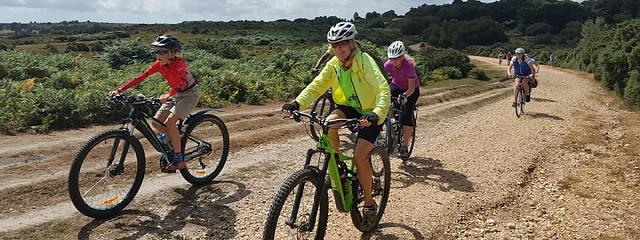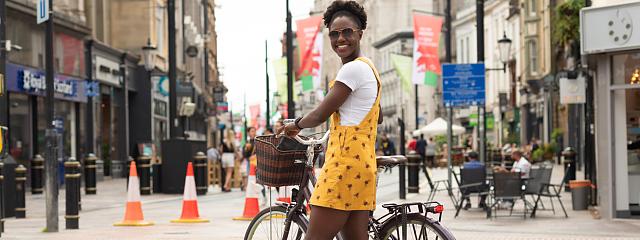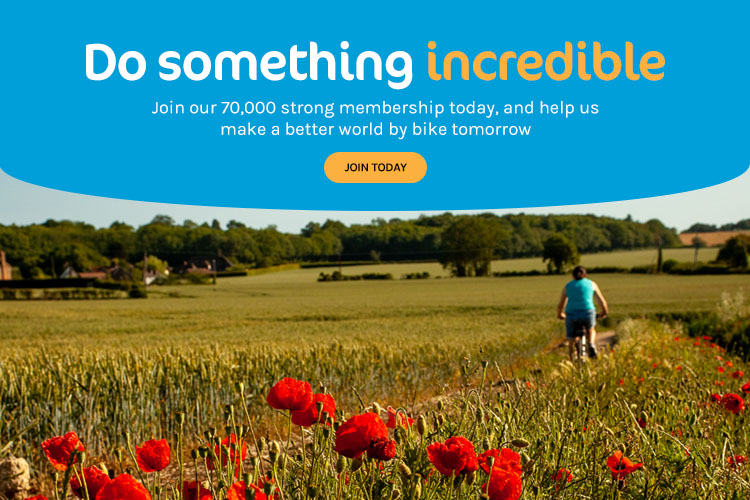
Cycling UK's five year strategy is refreshed
Cycling UK's five year strategy is refreshed
In 2018, Cycling UK's five year strategy was published, in 2021 it's been updated mid-way through its five-year run. The last year and a half has seen huge changes in society and in the cycling landscape. As a result of these changes, Cycling UK’s current strategy, which runs until 2023, is being refreshed.
The ‘what’ – the core goal – remains the same: to get millions more people cycling.
As to why: cycling is now even more relevant in a post-pandemic world.
The strategy will become more focussed as Cycling UK build on the successes of our campaigning and behaviour change programmes.
What's new?
Our refreshed strategy will focus on four priorities.
- We’ll enable cycling for all.
- We’ll speak for all who cycle.
- We’ll strengthen our organisation.
- We’ll build sustainable membership.
To find out more read the Cycling UK strategy refresh 2021 - 2023
More information on what Cycling UK has achieved in 2019 - 2021 can be found in the latest Annual Report and financial statements.
Enabling millions more people to cycle
Cycling UK became a charity in 2012 after 125 years as CTC - The Cyclists’ Touring Club.
We have done a lot for cycling, as a club and a charity. We have helped change the law, improved conditions for cycling and inspired and supported people to cycle. We have always been passionate about the potential of cycling to make life better for people.
In the early days, we were a lone voice. Today there are thousands of people and communities who share our passion and are making it easier for people to cycle. We are part of a growing social movement.
The UK faces huge challenges which more cycling could help fix – air pollution, obesity, poor mental health and traffic congestion.
However, despite the efforts and achievements of us and others, cycling levels in most parts of the UK remain stubbornly low. Only 2% of trips are taken by cycle, only 12% of women cycle regularly and just 2% of children cycle to school. And people from a BAME background and people with disabilities are significantly less likely to cycle than white, adult men.
If we are to shift these stubborn statistics upwards, we need a more ambitious purpose and a different strategy.
Read Cycling UK's strategy 2018
Our theory of change
There isn’t a single, simple solution to increasing cycling levels. Many things need to be in place – more inspiration and practical support for new cyclists; more and better cycling infrastructure; new laws and better law enforcement; better driver education; and a fundamental change in culture and attitudes towards cycling.
Change will happen differently in different places because of widely varying national and local contexts. Some places are moving forward much faster than others. They will provide valuable learning which will encourage others to follow.
Lots of actors have a part to play: governments and public bodies need to change and enforce the law, and invest in cycling; the media and celebrities can help change culture and attitudes.
However, we believe people are the key to bringing about positive, lasting change. People who are passionate about cycling as a vital ingredient in happier, healthier communities and who are willing to do something about it – by inspiring and helping others, by helping change attitudes, by influencing those with power and funding, and through creating and sharing knowledge.
Across England, Scotland, Wales and Northern Ireland, there are thousands of people who are creating and supporting a thriving cycling culture. They are educating, inspiring, influencing and supporting. They get things done through formal or informal community groups; through charities and social enterprises; in their schools and workplaces; in universities and think tanks; or via networks and digital platforms. Some work inside public bodies, others seek to influence them. Together we are an influential social movement.
Cycling UK needs to do much more to connect, equip and facilitate this movement, to increase its impact on cycling. That is the most important role we can play in bringing about the change we want to see.
At the heart of our strategy are people
We will attract more members and provide more opportunities for members to get involved in the cycling movement.
We want help get millions more cycling.
Come and enjoy the ride with us.








